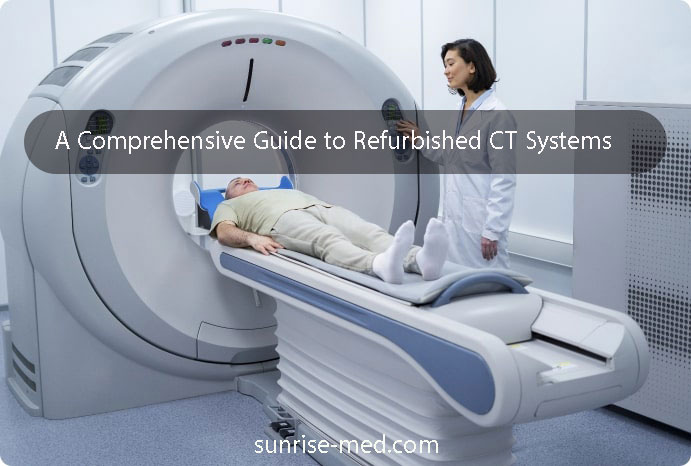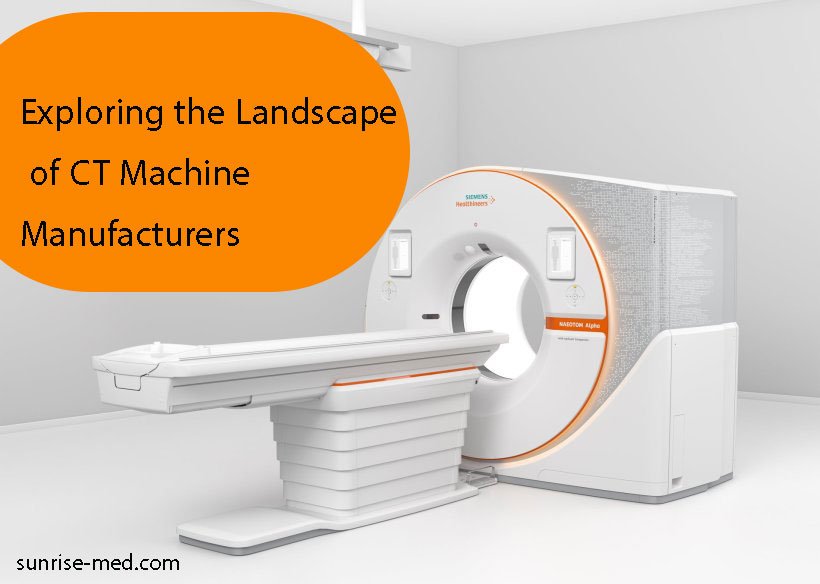Refurbished CT systems offer healthcare facilities cost-effective solutions to upgrade their imaging capabilities without investing in brand-new equipment. In this comprehensive guide, we explore the world of refurbished CT systems, examining the benefits they offer, important considerations for buyers, and current market trends shaping the industry.
1. Understanding Refurbished CT Systems
Refurbished CT systems are pre-owned imaging devices that undergo a comprehensive process of restoration, testing, and refurbishment to ensure they meet manufacturer specifications and quality standards. These systems are sourced from various origins, including trade-ins, lease returns, and equipment upgrades, and undergo refurbishment to extend their operational lifespan and performance capabilities.
2. Advantages of Refurbished CT Systems

Cost Savings
One of the primary advantages of refurbished CT systems is their cost-effectiveness compared to purchasing new equipment. Refurbished systems are typically available at a fraction of the cost of new ones, enabling healthcare facilities to achieve significant cost savings while still acquiring advanced imaging capabilities.
Access to Advanced Technology
Refurbished CT systems often include models and features that may be out of reach for facilities with budget constraints. By investing in refurbished equipment, healthcare facilities can access advanced imaging technology and features that enhance diagnostic capabilities and patient care.
Shorter Implementation Time
Refurbished CT systems can be installed and operational more quickly than new equipment since they are readily available and have already undergone refurbishment. This shorter implementation time allows healthcare facilities to upgrade their imaging capabilities and resume patient care without significant delays.
Warranty and Support
Many reputable vendors of refurbished CT systems offer warranties, service contracts, and technical support to ensure the reliability and performance of the equipment. This provides buyers with peace of mind and assurance that their investment is protected, similar to purchasing new equipment.

Environmental Sustainability
Investing in refurbished CT systems promotes environmental sustainability by extending the useful life of existing equipment and reducing electronic waste. By refurbishing and repurposing pre-owned imaging devices, healthcare facilities can minimize their environmental footprint and contribute to sustainable practices.
3. Considerations for Purchasing Refurbished CT Systems
Vendor Reputation
When purchasing refurbished CT systems, it’s essential to work with reputable vendors with a track record of quality refurbishment and customer satisfaction. Researching vendors, reading reviews, and obtaining references can help ensure a positive purchasing experience.

Quality Assurance
Buyers should inquire about the refurbishment process and quality assurance measures implemented by the vendor. This may include equipment inspection, parts replacement, software updates, and performance testing to ensure the system meets manufacturer specifications and regulatory requirements.
Technical Specifications
Evaluate the technical specifications and features of refurbished CT systems to ensure they align with the clinical needs and imaging requirements of the healthcare facility. Consider factors such as detector technology, spatial resolution, scanning speed, and dose optimization capabilities.
Service and Support
Assess the availability of service and support options provided by the vendor, including warranties, maintenance contracts, and technical assistance. Having access to prompt and reliable support services is critical for ensuring the uptime and performance of the CT system.
Compatibility and Integration
Consider the compatibility and integration capabilities of the refurbished CT system with existing infrastructure, software platforms, and clinical workflows within the healthcare facility. Seamless integration ensures smooth operation and interoperability with other imaging modalities and information systems.
Regulatory Compliance
Verify that the refurbished CT system complies with regulatory standards and certifications, such as those set forth by the Food and Drug Administration (FDA), European Medicines Agency (EMA), and International Electrotechnical Commission (IEC). Compliance with regulatory requirements ensures patient safety and legal compliance.
4. Market Trends in Refurbished CT Systems
Growing Demand
The demand for refurbished CT systems is on the rise as healthcare facilities seek cost-effective solutions to upgrade their imaging capabilities while facing budget constraints. The increasing prevalence of chronic diseases, aging populations, and healthcare reform initiatives drive the need for advanced diagnostic imaging technology.

Technological Advancements
Refurbished CT systems benefit from ongoing technological advancements, including improvements in detector technology, image reconstruction algorithms, and dose reduction techniques. Vendors continuously upgrade and refurbish pre-owned equipment to incorporate the latest innovations and enhance diagnostic performance.
Market Consolidation
The market for refurbished CT systems is characterized by consolidation, with established vendors acquiring smaller players and expanding their market presence. This consolidation trend results in greater economies of scale, enhanced service capabilities, and broader product portfolios for buyers.
Emerging Markets
Refurbished CT systems are gaining traction in emerging markets and developing regions where healthcare infrastructure is expanding, but budget constraints limit investment in new equipment. Vendors are increasingly targeting these markets with refurbished solutions tailored to local needs and affordability requirements.
Shift Towards Value-Based Care
The shift towards value-based care models emphasizes the importance of cost-effective healthcare solutions that deliver optimal clinical outcomes and patient satisfaction. Refurbished CT systems align with value-based care principles by offering advanced imaging capabilities at a lower cost, enabling healthcare facilities to maximize value and efficiency.
Conclusion
Refurbished CT systems offer healthcare facilities a cost-effective means of upgrading their imaging capabilities while maintaining quality and reliability. With benefits such as cost savings, access to advanced technology, and environmental sustainability, refurbished CT systems are an attractive option for facilities facing budget constraints or seeking to optimize their capital investments. By considering factors such as vendor reputation, quality assurance, technical specifications, service and support, and regulatory compliance, healthcare providers can make informed decisions when purchasing refurbished CT systems. As market trends continue to evolve, the demand for refurbished CT systems is expected to grow, driven by the need for affordable and efficient diagnostic imaging solutions in healthcare delivery.



